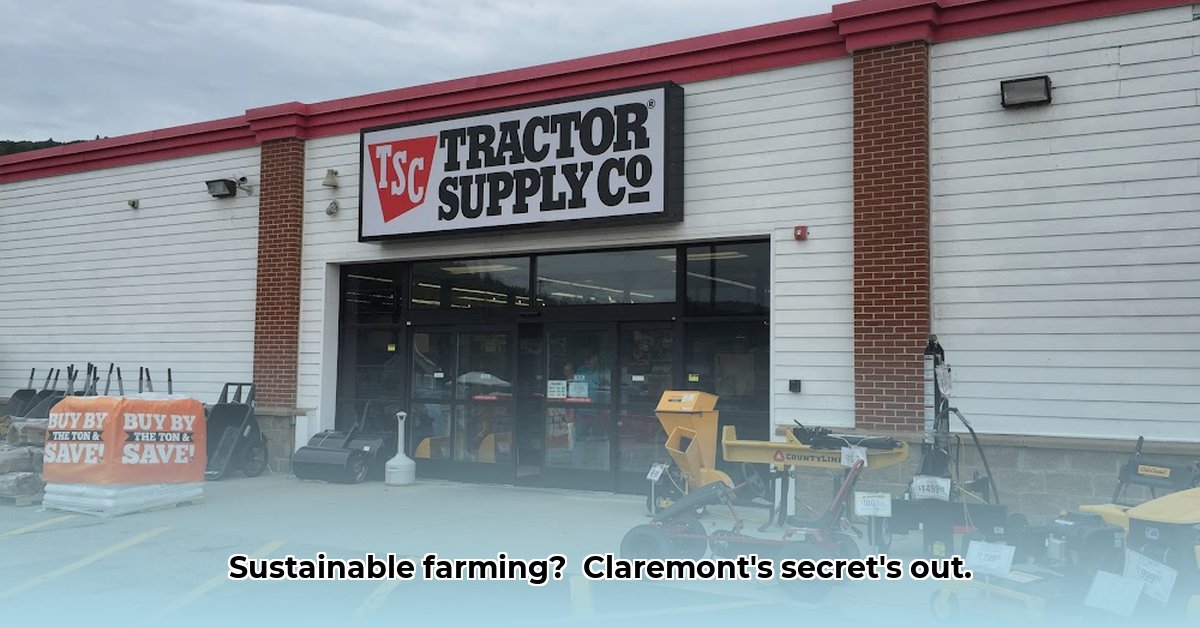
Tractor Supply in Claremont, New Hampshire: A Resource for Sustainable Agriculture
Tractor Supply in Claremont, New Hampshire, offers a range of products relevant to sustainable farming practices, making it a valuable resource for local farmers and gardeners. However, its role in supporting sustainable agriculture is multifaceted and presents both opportunities and limitations. This article explores Tractor Supply's contribution to Claremont's sustainable farming efforts, highlighting aspects of convenience, product availability, and areas for potential improvement. For information on alfalfa hay availability, check out this helpful resource.
Stocking Up on Sustainable Supplies
Tractor Supply stocks a variety of products that can support sustainable agriculture, ranging from seeds and tools to fertilizers and animal feed. While not all items are explicitly labeled "organic" or "sustainable," many align with these principles. For example, untreated lumber is available for fencing, representing a more sustainable alternative to pressure-treated wood. Additionally, many seed varieties are non-GMO. However, to effectively source sustainable supplies, consumers need to carefully review product labels and actively inquire about sourcing and production methods. This proactive approach allows for informed decision-making and support of sustainable practices.
Convenience and Accessibility: A Boon for Local Farmers
Tractor Supply's convenient location and extended hours (8 am to 9 pm 1) are advantageous for busy farmers and gardeners in Claremont. Easy access to essential supplies contributes to efficient farming practices and timely responses to changing conditions. This accessibility benefits both large-scale operations and smaller hobby farms. However, this convenience also creates a competitive landscape for smaller, local businesses focusing on sustainable products.
Limitations and Opportunities for Sustainability
Despite its potential, Tractor Supply's complete contribution to sustainable agriculture in Claremont remains unclear due to a lack of publicly available data. Sales figures for organic or sustainable products are not readily accessible, making it difficult to objectively assess the store's overall environmental impact. Similarly, information concerning the sourcing and sustainability practices of their suppliers is limited. This lack of transparency presents opportunities for improvement. By collecting and publishing data on sustainable product sales and enhancing transparency in its supply chain, Tractor Supply could significantly bolster its image and contribution to the local sustainable agriculture movement.
Community Impact: A Call for Collaboration
Tractor Supply's impact on Claremont's sustainable agriculture is a complex equation. It presents both opportunities and challenges. The store's convenient location and availability of supplies clearly support the community, but direct competition with smaller, sustainable businesses necessitates a collaborative effort. Increased transparency on Tractor Supply's part regarding sustainable product sales and supply chain practices would greatly benefit local farmers and consumers. Furthermore, partnerships between Tractor Supply and local farms could create win-win opportunities, perhaps through dedicated sections within the store showcasing locally produced goods. Conscious consumer choices, prioritizing sustainable and locally sourced products, play a crucial role in supporting this collaborative vision.
How Consumers Can Support Sustainable Agriculture in Claremont
Consumers can actively contribute to a more sustainable local agricultural system through several key actions:
Informed Choices: Carefully select organic seeds and environmentally friendly options when shopping at Tractor Supply. Examine labels closely and utilize staff knowledge regarding product sourcing.
Demand Transparency: Actively inquire about product origins and environmental impacts. Encourage more transparency from Tractor Supply regarding its practices and supply chains.
Support Local Farms: Frequently purchase directly from local farmers through farmers' markets and other direct channels. This directly boosts local sustainable agriculture.
Conclusion: Building a Sustainable Future Together
Tractor Supply in Claremont possesses significant potential to contribute to the local sustainable agriculture movement. However, realizing this potential requires a collaborative effort involving the store, local farmers, and conscious consumers. Increased transparency, data collection, and strategic partnerships can transform Tractor Supply into a stronger ally for sustainable farming in Claremont, furthering the community's commitment to environmentally responsible practices.